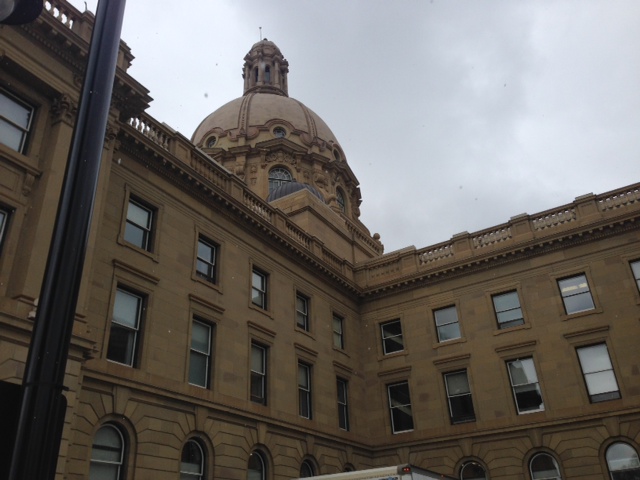EDMONTON — It’s no secret the Alberta government is facing one of its toughest budgets in decades due to the falling price of oil, and on Thursday morning Albertans may get a better idea of just how bad of a spot the province is in.

Finance Minister Robin Campbell addressed the upcoming budget and the current financial challenges facing the province during a news conference in Edmonton. The government is asking Albertans to identify spending reductions and revenue opportunities in an online survey. Officials also want to hear people’s ideas about stabilizing the province’s revenue in the long-term.
“This situation requires tough decisions from government and we want to hear from as many Albertans as possible,” said Campbell.
“Albertans expect that government will find savings and tighten its own belt before examining any other option.
“Hearing and listening to Albertans’ comments is important as we transition to a long-term sustainable fiscal framework.”
The online survey will be available until the end of February.
The province said ministers and MLAs have been talking about budget issues with Albertans in town hall meetings, Chamber of Commerce events and call-in shows. It says more than 1,500 Albertans have written and called in to voice their ideas on how to reduce spending, increase revenue, and about deficits and debt.
Premier Jim Prentice has been up front about the challenge the province is facing in light of the changing economic landscape.
“It’s the most serious fiscal circumstance we’ve seen in a generation in this province,” Prentice said last month, adding the dramatic drop turned a $1.5 billion surplus in November to a $500 million deficit in January.
Oil prices, the lifeblood of Alberta’s economy, have been in free fall since the summer, tumbling from US$100 a barrel to below US$50 a barrel in the new year. The province predicted a barrel of West Texas Intermediate crude would average $92 a barrel this fiscal year, ending March 31; that was revised to almost $89 in November as prices fell.
Each $1-drop in the average price over the course of a year costs the province $215 million. Oil prices have plunged so far, so fast that the province expects it will have to dip into a $5-billion rainy day contingency fund to cover off some of the red ink.
Prentice said “austerity will start at the top,” and last week put that promise into action. Cabinet agreed to take a five per cent wage cut, effective Feb. 1, and called on all MLAs to follow suit.
On Wednesday the Legislature agreed, although the NDP called the move a cynical gambit to seize the moral high ground prior to cutting the wages of nurses, teachers and other public sector workers.
READ MORE: Alberta MLAs cut salaries by five per cent; NDP calls it cynical politics
The premier’s salary was reduced by $10,887, cabinet ministers each gave up $10,050, and MLAs lost $6,700 each. Prentice said the pay cuts will result in about $600,000 in savings.
On Thursday, the province said it is also restricting hiring, reducing travel and limiting discretionary spending. It also said all government departments have been ordered to examine their operations for cost savings.
The premier also said last month that Alberta’s economy is on a razor’s edge, and without deficits the low price of oil could push the province into a recession.
Despite the doom and gloom, Prentice has effectively ruled out any big tax changes to help cushion the fall. Earlier this week he said he’s not interested in hiking Alberta’s 10 per cent corporate tax rate. Prentice said other provinces have similar rates, and fears hiking Alberta’s levy risks making it uncompetitive.
The premier previously said he doesn’t want to hike oil royalty rates, and on the weekend said the proposal for a provincial sales tax is effectively dead. He is still considering changes to the 10 per cent personal income tax. Alberta is the only province with a flat tax; all others follow brackets similar to federal income taxes.
With files from The Canadian Press





Comments